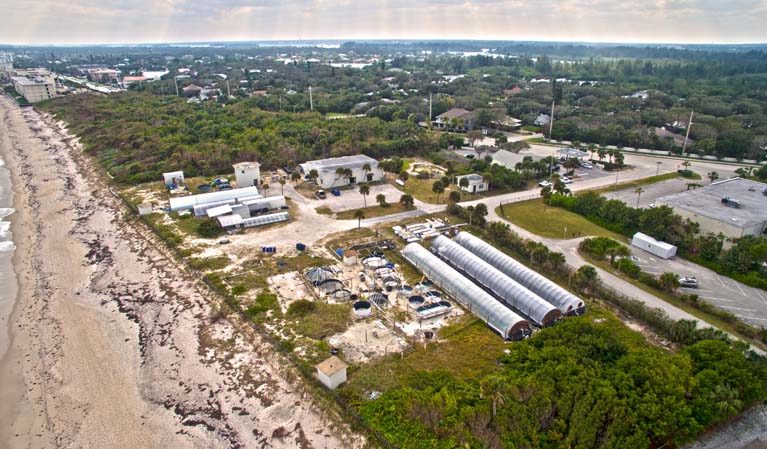
News last week that Indian River County is preparing a bid to buy four oceanfront acres where Florida Institute of Technology long operated a marine research lab raised questions about what happened to big plans for the 32963 site that FIT announced with fanfare several years ago.
In 2013, then university President Dr. Anthony James Catanese said, “We plan to build a significant new building that will include some kind of public facility where members of the community can observe our marine and aquaculture labs. We want to have a learning center and other features that will make the lab a destination people will drive in to visit.”
The university launched a fundraising effort in Vero to build a 20,000-square-foot $10 million facility projected to open in 2015, and Catanese said FIT planned to add new faculty and expand research into the areas of lagoon preservation, beach renourishment, ocean engineering and general oceanography, bringing many more scientists and science students to Vero Beach.
“There have been rumors since we got ownership of the property that we offered to sell it to developers, but that is absolutely untrue,” Catanese said. “Our goal is to become much more involved in Indian River County and get people to view us as their private technological university.”
An architect’s rendering circulated at the time depicted a handsome multistory building, presumably containing offices and laboratories, and neat rows of aquaculture tanks above the beach, all intended to replace the dilapidated former military buildings in which the lab was operating. But those plans never materialized.
University spokesman Wesley Sumner last week attributed the demise of the university’s initiative to several factors, including the death of longtime lab supervisor Professor Junda Lin and perhaps more importantly a lack of donations.
“Private fundraising never developed,” Sumner said. “As for our fundraising goals [for the lab], there was nothing of significance in 2016-2017.”
Sumner says the university has received multiple bids on the 4-acre property, which is located behind the 7-11 on A1A, adjacent to Tracking Station Park, and has an appraised value of $2.1 million.
County Administrator Jason Brown said he’s certain the site has “some appeal” for other potential buyers, perhaps drawing interest from developers.
Should the lab site wind up in the county’s hands, it would allow county planners to expand parking and beach access for visitors at Tracking Station Park.
Indian River Board of Commissioners chairman Joe Flescher is excited about that possibility.
“Location, location, location,” he said during a phone interview. “There’s beach access; it can be a great draw, and a draw for tourism.”
Flescher also addressed potential competition from builders. “Can we match a developer’s bid? I don’t know.”
FIT opened its seaside laboratory and aquaculture operation near the southern border of Indian River Shores in 1980, when the U.S. Air Force decommissioned the property and turned it over to the school on a 30-year lease.
The Melbourne-based university took ownership of the property in 2010, around the time it first began thinking of an expanded facility.
Sumner talked about the scope of the lab’s work during its more than 30-year existence. Research focused on seahorse lifecycles, improved aquaculture techniques for both ornamental and game fish, and rebuilding game fish populations in the Indian River lagoon following a series of destructive algae blooms.
Activity at the center reached its apex around 2013-14. First came the expansion announcement. Then seahorse researcher Nancy Pham launched a summer camp for children ages 10-12. In 2014 she added a second week to the camp program and more than doubled enrollment. At the same time, several private aquaculture companies were working with FIT scientists and raising aquarium fish on the site.
But then the fundraising effort faltered and Dr. Junda Lin passed away in March 2016 following a seven-year battle with cancer. Lin was a Professor of Biological Sciences at FIT and had served as director of the Institute for Marine Research since it was founded. His work was focused on developing what reefbuilders.com dubbed “aquaculture technology for marine ornamental species to offset and replace wild collection.”
When Lin died, the lab seemed to go dark. There was no summer camp that year and in November 2016 Sumner told Vero Beach 32963 that “the university is assessing how to best utilize the facility. In the interim, university activity has been curtailed while we complete this assessment.”
That activity never resumed and now the site is up for sale. Sumner said Pham’s seahorse research and other programs that were housed at the lab have been moved to FIT’s main campus in Melbourne.



